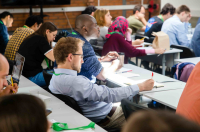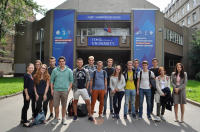Wrocław University of Science and Technology
Wrocław University of Science and Technology is Poland’s largest technical university that holds leadership positions in Poland’s national rankings. Since its founding in 1945, it has been among the country’s main centers for technical education. As of today, about 30,000 students study here on 43 program tracks, 37 of which are also available in English.
Being a member of the European University Association and the European Society for Engineering Education, Wrocław University of Science and Technology has established contacts with many of the world’s educational and research institutions (currently, it has collaboration agreements with 205 partners from 49 countries), and offers various joint degree programs.

The university’s students participate in international programs such as Erasmus+, Leonardo da Vinci and others; they also have an opportunity to get experience at the research labs of its business partners, as the university’s mission includes studying of the economy’s relevant requirements and active cooperation with the industry. Over the past decade, the university received 1283 patents; 887 didactic, 175 research and 13 accredited laboratories are currently part of the university, and the students can get internships and conduct their thesis work at subdivisions of such companies as Nokia, Volvo, Ryanair and other.
The university bills itself as a rapidly developing institution. Over the last years, the new Geocentrum educational and research complex has been added to the university’s campus, as well as Technopolis - two modern buildings of the Center of IT and Communication Technologies and the Centre of Education and Technology that act as educational, scientific and laboratory centers. The campus itself was deemed amongst the world’s 15 most beautiful places according to The Huffington Post magazine.
Studying in Poland
The academic year at Wrocław University of Science and Technology starts in October; yet, international students should consider arriving a little earlier in order to get accustomed to their new place of study.
The programs are taught in English, though a student can also take a Polish language course, like Artem did. In addition to the subjects of his program track, he had two academic hours of Polish every week, and also attended supplementary courses of English and an elective on Poland’s history and culture. This way, not only did he improve his English skills, but also learned basic Polish.

Amongst his regular subjects were operations management, digital economy and information system analysis that he’d already been studying at ITMO, as well as several new subjects for him such as logistics management tools and management accounting. One of the key tasks for the semester included a research in legal protection of information.
“I chose this subject on purpose, as I wanted to see and compare how information protection is implemented in Europe and back home. What is more, I’ve been studying this subject since my Bachelor’s years, comments Artem Koksharov. I’ve been comparing the operating principles of information protection in Poland, Europe, and Russia. In general, I can say that Europe is now completely focused on digital economy; this is reflected in the essential changes in their legislation on personal data security and methods of personal data processing. These changes will come into effect and bring the first results as soon as May.”
In Poland, students don’t have midterm exams, just the final tests at the end of the semester; the maximum score is 5.5. Another peculiarity that students have to keep in mind is that the first lectures start at 7:30, so you won’t have the chance to sleep in.

Living in Poland
Artem chose to stay at the university dorm. The dorms at Wrocław University of Science and Technology are modular: each module has two double and two triple rooms; the rooms are spacious enough, so even triple rooms are very comfortable to be in. The fee for the dorm is 370 zloty (about 6,700 rubles or 118 USD) a month.
You can cook for yourself at the common kitchen or eat at any of the three student dining halls; even if you choose the second option, you can still save much on food.
“The main dining hall occupies a separate huge building. The dining tables are on the first floor, and on the second they have a cafeteria that opens a little earlier than the rest of the dining area, explains Artem. Also, they have this offer when you can choose whatever you like and buy it by weight. In Poland, this approach is popular with not just universities. As far as I know, we don’t have cafeterias like that in Russia, which is a real shame, as they are very convenient.”
Many venues in Poland offer student discounts; for instance, you can eat out cheap in not just the university canteen, provided you have your student ID with you. Visiting different museum and exhibitions is also much cheaper if you’re a student.
The traffic network in Wrocław is well-developed despite the city’s small size; public transportation works at night, as well. Upon arriving, one can buy a travel card that will work for five months for just 150 zloty (about 2,500 rubles or 45 USD).

In the university, there are more than 200 different organizations and clubs, including those on sports and arts, so there’s no way you’ll get bored in your free time. There are also several volunteer groups that help organize interesting activities for international students.
“On the whole, Wrocław is a great city for students, who constitute almost a third of its population. Thus, finding entertainment here is very easy. In Wrocław, they have a whole nightlife district where they have lots of bars, cafes and nightclubs. The entrance is either free, or very cheap,” comments Artem Koksharov.
He adds that a great advantage of studying in Poland is the opportunity to travel around Europe fast and cheap. For instance, in the course of that single semester he managed to visit Norway, Hungary, Germany, Italy, France, and Greece.
Future prospects
Artem plans to continue on with his studies and considers going abroad for a PhD program. He also notes that the knowledge he got during the recent semester allows him to not limit himself with his current field, but try others that have to do with analyzing technological markets, project management, and other adjacent fields.
“I really liked studying in Wrocław, I got to meet lots of people from different countries and learn many new things. As of now, I am considering continuing my studies abroad, going for a PhD in Wrocław or any other European city. My field is quite specific - I study technological entrepreneurship and innovations development. I am sure that in the future, there are great prospects for both this particular field, as well as management and economics in general,” concludes the student.
You can learn more about the academic mobility programs offered by ITMO University here.





